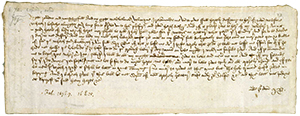)
How can the study of dusty manuscripts lead to the creation of interactive digital mapping tools? How does digitising globally significant medieval and early modern letters lead to donning walking gear and creating heritage trails across Norfolk?
These are the questions Dr Karen Smyth's research and impact work seeks to answer. As one of several in the School of Literature, Drama and Creative Writing’s faculty, Dr Smyth is widening access to, and inviting creative interpretations of, the region’s medieval and early modern archival collections. As a consequence, the international significance of hidden treasures in Norfolk's archives are being given new life.
Dr Smyth’s project, ‘600 Paston Footprints’, was awarded Heritage Lottery Fund support in 2016 to celebrate one of Norfolk’s greatest treasures. The Pastons were Norfolk’s most prominent family from 1380-1750, rising from medieval peasants to become lawyers and enter the dangerous European battlefields and Tudor courts. As Smyth’s research reveals, the family had significant literary and cultural roles for over 300 years. 600 Paston Footprints will be the first ever large-scale community project to uncover specific local links with this vibrant heritage and bring to life the remarkable collection of the Paston Letters. It is a timely project, with 2018 marking the 600th anniversary of the first letter, which will be celebrated in a major festival, exhibitions, heritage walks and online provisions.
Dr Smyth said:
“What underpins the range of activities is the empowering of local people to access links to their heritage through skills training and through making the heritage accessible.”
The impact of collaborative heritage projects is evidenced in Smyth’s co-authored articles in Health and Place (UEA repository) and a chapter due in print in 2017 in 'Beyond Impact: The Value of Collaborative Research', ed. Facer and Phal (Policy Press).
Smyth continues:
“The project aims to digitise the 16th and 17th century collections that are held in the Norfolk Record Office (NRO) and join them through a single web portal, allowing online public access with interpretative scaffolding to the collections for the first time. Immersive podcasts of 10 heritage trail walks in the Paston Country of Norfolk are being developed collaboratively with Dr Holly Maples at Brunel University, allowing for further research into aspects of medievalism and spectatorship studies.
"The pastons also hold an important place in norwich's unesco city of literature status as significant patrons of literature that can inspire writers of today. Creative, artistic, and innovative interpretations will be a major feature of this project, bringing together medievalists and early modernists and the thriving literary and dramatic sectors of the community today.”

Project partners include the co-directors, Paston Heritage Society, in addition to the NRO, Norfolk Heraldry Society, Community Action Norfolk, Hungate Medieval Art, Active Norfolk-Fit Together, Norfolk Libraries and Museums, the Diocese of Norwich, Norfolk Historic Environment Service and district and parish councils. Numerous other community and heritage organisations are to be involved, and those further afield such as Yale University’s British Centre for Art and the British Library. The project also includes 10 regional Hubs, bringing together schools, historical societies and church communities.

Paston Letter 72
The crowd-sourcing archival skills training that underpins this project to enable the public to access early heritage was developed from Dr Smyth's AHRC-funded 'Preserving Place' project (Smyth was Principal Investigator of an AHRC grant, 07/14 – 07/15, with Drs Pinner, Spooner and Gregory from Literature and Landscape History, and Dr Power from Social Geography at the University of Southampton.This work explored collaborative, community-based, investigation of the ways in which East Anglian communities imagine their relationship to places and their heritage. The findings were then translated and digitally visualised as community narratives, inspired by composite mapping practices found in Norfolk’s early archives (as seen in Smyth’s forthcoming article on Norwich’s famous 16th-century cosmographer, William Cunningham). One of the key outcomes of this project is a digital mapping tool which aims to provide community groups across the country with a planning mechanism for future heritage projects, by visualising routes that work well, what obstacles there are and possible solutions in conducting heritage research. This dynamic tool is playing a central role in the 600 Paston Footprints project. Watch an animation of this tool.
Are you interested in finding out how to become involved in the Paston Footprints project? Please contact Karen at PastonFootprints600@gmail.com or tweet @pastonfootprint.